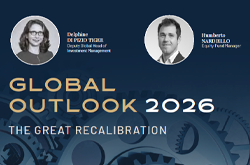A tightrope walker’s journey
Monthly House View - November 2024 - Download here
Will November be a month of significant change? The US presidential election on 5 November, highlighting a deeply divided America, may well contribute to it. The risks are clear:
• Internal tensions: The country is polarised, and this summer, the Texas Republican Party even raised the possibility of secession, advocating for a referendum on the “Lone Star State” becoming an independent nation. While a “Texit” seems improbable to us, it is significant to highlight that Texas was part of Mexico until 1836, after which it remained independent until joining the United States in 1845.
• External challenges: Geopolitical hotspots are intensifying, from the war in Ukraine at Europe’s borders to the conflicts in the Middle East and growing tensions around Taiwan.
Somewhat counterintuitively, a Donald Trump victory could, from a certain perspective, ease both internal and external tensions. Domestically, the risk of contested election results would decrease, possibly averting another Capitol riot. Internationally, while Trump has threatened to withdraw the US from NATO, complicating Europe’s defence, he could serve as a peace facilitator in the Middle East. Let us not forget that he was several times nominated for the Nobel Peace Prize for his role in mediating the Abraham Accords between Israel and the United Arab Emirates in 2020. Reportedly, Donald Trump has expressed a desire to pursue further peace efforts in the Middle East, with the ambition of finally winning the Nobel Prize.
It is worth noting that in mid-October, the Nobel Prize in Economics honoured three scholars—Daron Acemoglu, Simon Johnson, and James Robinson—for their research on the role of institutions in a nation’s prosperity. Their findings showed that countries with inclusive institutions experience stronger economic development than those based on the enrichment of the elite.
This might help explain why the United States, colonised by Europe 500 years ago, has grown wealthy due to its robust institutional framework.
The rapid rise of China’s economy, now the second-largest globally, without adopting democratic institutions raises an important question: to what extent does leadership stability play a key role, especially when it comes to implementing long-term social and environmental policies? Today, nearly 150 countries have pledged to achieve carbon neutrality, most by 2050 or 2060. In contrast, political shifts in the US can occur every two years, making it difficult to ensure continuity in critical policies, as we saw when Trump withdrew the US from the Paris Agreement at the start of his first term.
At present, financial markets are betting on continuity, not pricing in major shifts ahead of the election. Meanwhile, the “industrial revolution” of artificial intelligence (AI) is well underway. As we enter the third-quarter earnings season, the US stock market is seeing its best performance year since 19971! The steady decline in interest rates adds further momentum, with the market seemingly embracing the possibility of a soft economic landing.
Yet, the markets’ path is far from smooth. For this reason, in this edition, we explore what we call the “tightrope walker’s journey”, the delicate balance of market forces as economic data is constantly revised. And what if, ultimately, things don’t turn out as expected?
1 - Performance of the S&P 500 as of mid-October 2024.
Monthly House View, 18.10.2024. - Excerpt of the Editorial
October 30, 2024




